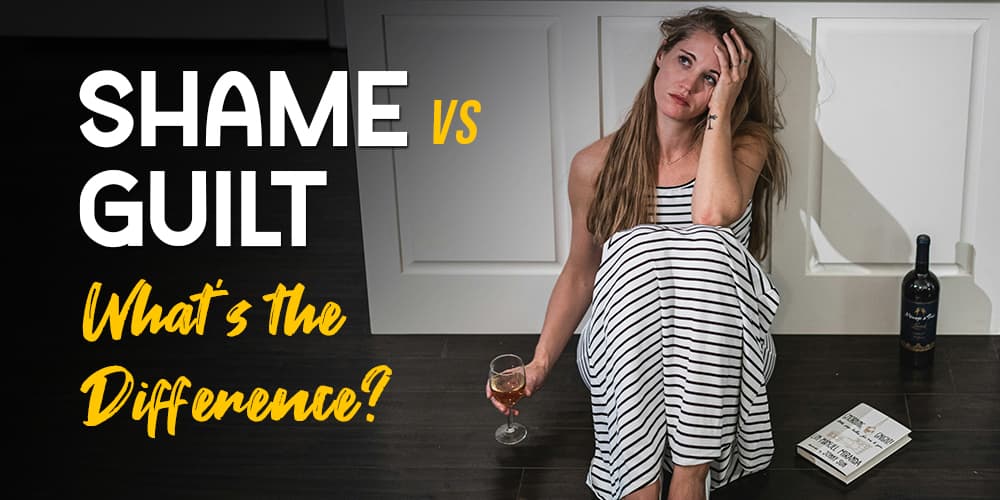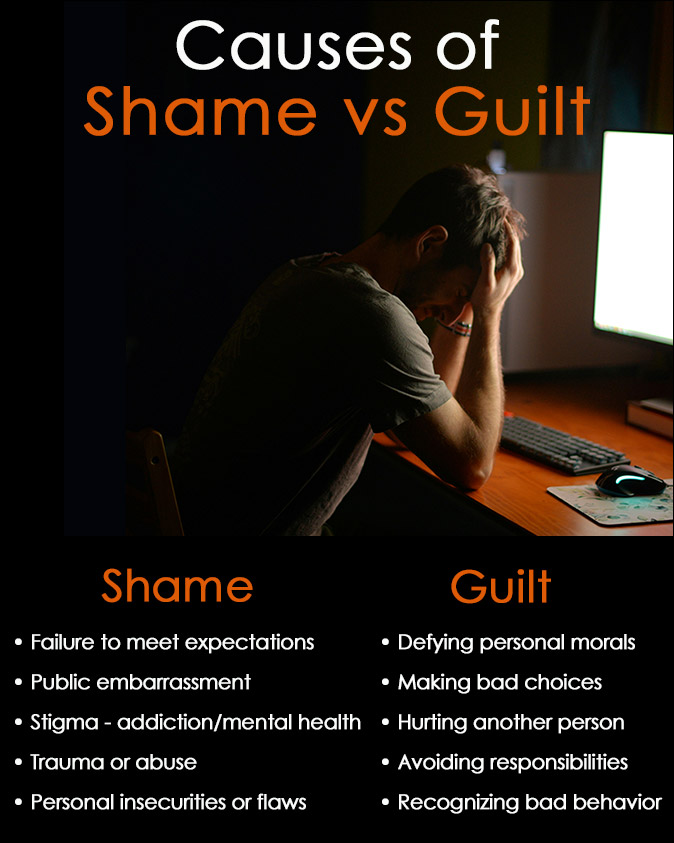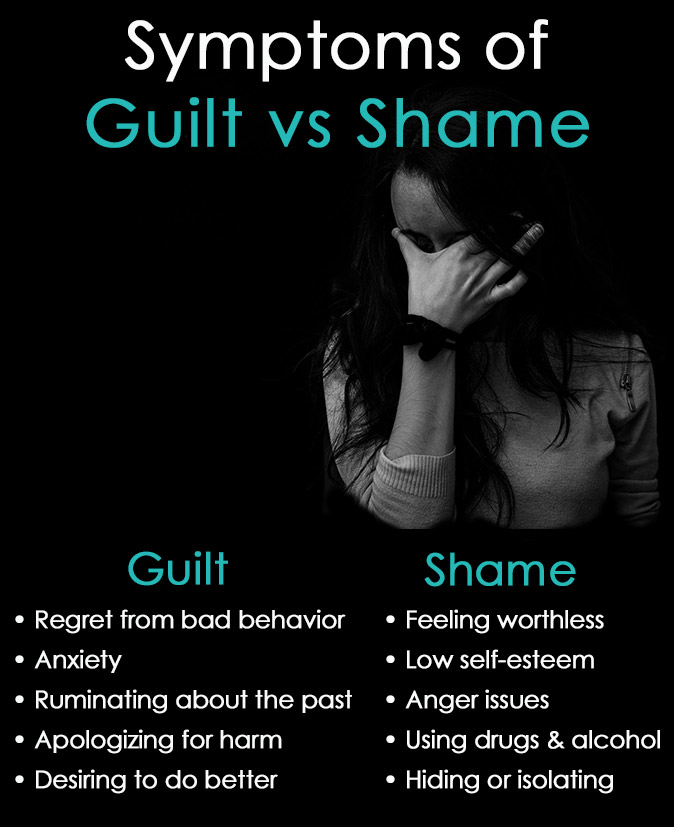
Even though there are differences in the meaning and characteristics of the words shame vs guilt, they are often used interchangeably.
Both guilt and shame can have a powerful impact on many types of mental health disorders and daily living. They also play an influential role in addiction and recovery.
It’s possible that shame and guilt can lead to positive personal growth. But first, it’s necessary to have a better understanding of the causes, symptoms, and nuances that differentiate each one.
The Difference Between Shame vs Guilt
It’s easy to confuse the difference between shame vs guilt because they share similar traits.
They can vary in the extent to how each one makes us feel emotionally, though, and also the way we view our self-worth.
The distinctions can significantly alter the way we deal with them as well.
Definition of Shame
The Merriam-Webster Dictionary definition of shame is, “a painful emotion caused by consciousness of guilt, shortcoming, or impropriety; a condition of humiliating disgrace or disrepute.”
Definition of Guilt
Merriam-Webster defines guilt as, “the state of one who has committed an offense especially consciously; feelings of deserving blame especially for imagined.”
Shame is deeply emotional and causes an individual to perceive they are personally flawed or inadequate and can lead to a negative self-image and social withdrawal.
It’s interesting that the shame definition includes the word “guilt,” possibly signifying that shame is a more powerful feeling than guilt.
On the other hand, guilt is a feeling of regret caused by a specific action or behavior. Even though it can cause a negative feeling, it is usually not extreme enough to affect a person’s sense of self-worth.

Causes of Shame vs Guilt
Just as there are subtle variations in the meaning of the two terms, there can also be differences in the causes of shame vs guilt.
Causes of Shame
- Failure to meet internal (personal) or external (societal) expectations
- Public embarrassment from negative actions or personality traits
- Stigma of addiction, mental health, or financial troubles
- Trauma or abuse
- Personal insecurities
- Feeling flawed or inadequate
Causes of Guilt
- Defying personal morals or ethics
- Making a bad choice that a person knows is wrong
- Hurting another person physically or emotionally
- Avoiding personal responsibilities
- Recognizing that a personal action or behavior was harmful
Shame can be caused by internal or external forces, sometimes beyond our control, like abuse or childhood trauma in adults, whereas guilt is usually due to negative personal choices or behavior.
Shame vs Guilt Examples
Whenever a person does something bad, it can lead to negative feelings or emotions.
It’s helpful to use examples of shame vs guilt to understand how the same action can have different emotional results.
1. Making a joke about a person’s clothing
If an individual feels bad about mocking another person’s clothes and they apologize, they do it out of guilt. But if they feel like a horrible person for making the joke, they are experiencing shame.
2. Cheating on a spouse
If a person regrets cheating on their spouse and promises not to do it again, they do so because they feel guilty. But if they feel they are not worthy of being married any more, they are experiencing shame.
3. Missing a child’s soccer game
If a parent misses their child’s soccer game, they feel guilty and guarantee they won’t miss the next game. But if they feel like missing the game makes them a worthless parent, they are dealing with shame.
4. Alcohol dependence or addiction
If a person recognizes they have a problem with drinking too much alcohol and feel guilty about it, they might decide to seek treatment. If they feel shame, the stigma and embarrassment may cause them to avoid asking for help or going to treatment.
Symptoms of Guilt vs Shame
The symptoms of guilt and shame can be similar, although the severity of the feelings and the actions taken can be quite different.
Symptoms of Guilt
- Regret from bad behavior
- Anxiety from doing something wrong
- Ruminating about the past
- Apologizing to others for causing hurt
- Desiring to do better
Symptoms of Shame
- Feeling worthless
- Low self-esteem
- Anger issues
- Reckless behavior like using drugs and alcohol
- Hiding or isolating from others
Guilt symptoms can have a positive effect that may lead to empathy for hurting another person and often motivate a person to do better in the future.
The symptoms of shame can sometimes act as a form of learned helplessness and cause a person to shut down and avoid being around others from feeling worthless.

Ways of Dealing with Shame vs Guilt
It can be more difficult to overcome feelings of shame vs guilt, because shame produces negative emotions of self-worth and inadequacy as a person, instead of simply feeling guilty about bad behavior or actions.
It’s not always easy to heal from the feelings of guilt and shame, and it may take time and effort, but it is possible for everyone. Here are some tips.
Coping With Guilt
- Recognize the guilty feelings
- Accept that you are feeling guilt
- Take responsibility for your behavior
- Apologize and make amends for your actions
- Forgive yourself for your behavior
- Promise yourself and others that you will do better in the future
Overcoming Feelings of Shame
- Try to identify the root cause of your shame
- Understand that shame is more about personal perception than reality
- Learn ways to overcome negative thoughts and beliefs about yourself
- Practice self-care and self-compassion
- Focus on personal accomplishments and cultivate more of them
- Ask for guidance from family and friends
- Seek professional therapy if needed
Treatment approaches like Cognitive Behavioral Therapy (CBT) can be effective for identifying negative thought patterns and responding in a healthier way.
Frequently Asked Questions
What is the role of shame vs guilt in addiction?
Guilt and shame play different but important roles in addiction and recovery.
Guilt can cause feelings of regret about bad behavior and actions from addiction to drugs or alcohol. But it can also provide healthy motivation to seek treatment, change behavior, make amends, prevent relapse, and heal in recovery.
Shame can be toxic for recovery because it causes a person to feel they are flawed and not worthy or capable of recovery. It also leads to self-destructive thoughts and behaviors that increase addiction triggers and promote relapse.
It’s much more important to identify and manage thoughts of shame versus guilt in recovery.
How do guilt and shame impact mental health?
Guilt is usually less harmful to mental health than shame, and often focuses more on the positive motivation to correct bad behavior.
Shame is strongly associated with social withdrawal, substance use, and low self-esteem that encourage depression, anxiety disorders, some types of PTSD, and other mental health issues.
Are shame and guilt considered thoughts, feelings, or emotions?
Guilt and shame both create negative thoughts and feelings, but they are classified as emotions or complex emotional states that rise above simple beliefs or opinions associated with thoughts and feelings.
How can I tell the difference between shame vs guilt in everyday situations?
Guilt focuses on a specific bad behavior, and shame focuses on the perception that you are a bad person.
When you feel guilty, you know what you did was wrong, but you don’t feel like you are a bad person because of it. With shame, you know what you did was bad, and you also think you are an inherently bad person.
Guilt motivates people to own up to their mistakes, apologize, and not do it again in the future. Shame causes people to withdraw socially or hide because of their bad behavior.
How does shame impact long-term mental health compared to guilt?
Shame is strongly connected to depression, certain types of anxiety disorders, and low self-esteem, which perpetuates many mental health conditions. Overcoming negative feelings of worthlessness can make recovery more difficult than for people with higher self-esteem.
Because guilt places blame on specific actions instead of self-worth, it can motivate people to seek help and improve behavior, so it has a lower long-term mental health impact than shame.
Can shame and guilt have any positive effects if managed properly?
Yes, both shame and guilt can have positive effects on behavior, mental health, and addiction recovery.
Guilt can motivate people to change their behavior, make amends, and take responsibility for their actions.
Shame can be less conducive to positive change than guilt because it internalizes feelings of worthlessness and social withdrawal. But when individuals learn to identify reality instead of their incorrect personal perceptions, it can be a motivating force for them to change.
Related Posts
- Eustress vs Distress Examples and Effects
We all experience stress, but there are different types and not all of them are…
- CBT vs DBT Are Similar Yet Different Therapies
Behavioral therapies, like CBT vs DBT, are terms that sound more intimidating than they are…
- Borderline Personality Disorder vs Bipolar - Is BPD Worse?
Understanding and distinguishing the differences between Borderline Personality Disorder vs Bipolar Disorder can be difficult…
